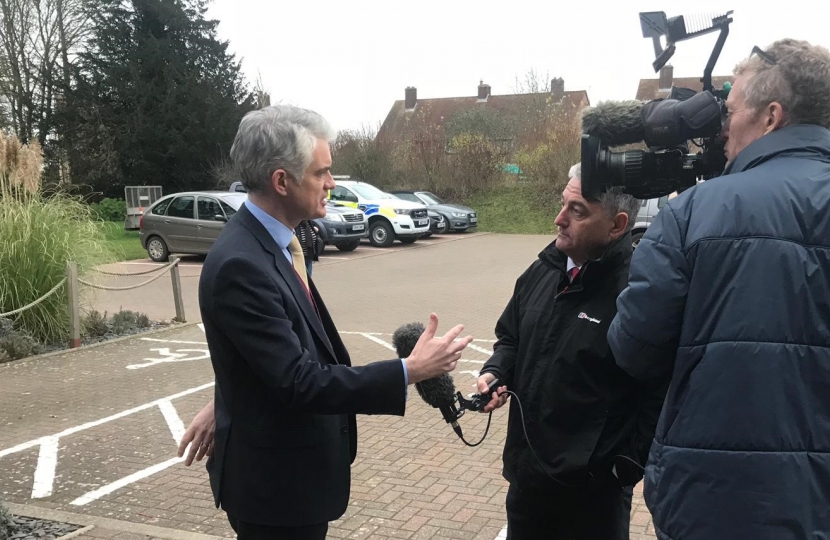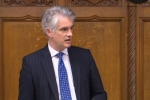
Below you will find my current position on Brexit.
To start with, many of you have written to me requesting a second referendum or to support the ‘revocation’ of Article 50, i.e. cancelling Brexit. Although some of you advocating a second referendum state explicitly that you voted leave and have changed your mind, I would hazard a guess that the overwhelming majority of those pushing for a ‘people’s vote’ backed remain and want to overturn the original vote to leave. I respect the fact that so many people feel that what is transpiring in reality through Brexit is not what they believe they were promised and that therefore the question should be put again, now that the detail has become known. Nonetheless, as I have said many times before, in my view I voted the original referendum into law to settle the European question once and for all and I promised to respect the result. I stand by that position and still believe the priority must be to find a sensible way to deliver on that original referendum result which was to leave. Delaying Brexit has frustrated many leave voters, but to revoke would be truly to renege on promises made quite explicitly in the last general election by both main parties to deliver our departure from the European Union. Finally, it is worth emphasising that Parliament has firmly rejected both revocation and a second referendum on more than one occasion.
As if to underline the extraordinary division that we now face, after second referendum/revoke the most common argument I have received by email is that Britain should leave without a formal agreement, i.e. ‘no deal’ (indeed, quite a few of you now argue that we should accept either one of these polar opposite outcomes). There has been much debate on the potential impact of ‘no deal’. The only thing we can say for certain is that nobody knows for definite what would happen, one can only make an informed assessment of the risks and benefits. To be frank, if any of us knew exactly what the future held we would not be writing these emails but enjoying time on a beach in Barbados having remortgaged the house to back Tiger Roll for its second grand national success on the trot. We do know one point with absolute certainty: the day after leaving without a deal, tariff free trade with the EU would come to an abrupt halt. That is an absolute fact. I have written extensively on this before as I believe this outcome alone would pose huge problems to large parts of our industry. If people disagree, I am bound to ask two simple questions: if WTO is such a good model for the UK economy why is it that in the entire referendum debate, not a single leave campaigner of any standing at any point advocated WTO as the solution? The public were certainly given no warning of that potential outcome, so it’s hard to see how they could have been voting for it.
Furthermore, why is it the case that countries around the world spend their time negotiating trade deals that are superior to the ‘bog standard’ default terms embodied by WTO? I do agree with those Brexiteers who believe that the threat of ‘no deal’ has negotiating impact because it is common sense that in any negotiation one has to be able to walk away to have leverage. Nevertheless, the other ‘definite’ is that Parliament is opposed to the WTO model for departure. Even though ‘no deal’ is the legal default, it is quite clear that Parliament has to be able to support our Brexit – whatever form that takes – if we are to leave with the appropriate laws in place. Hence, ‘no deal’ is a non-starter at present no matter its rights and wrongs or how fervently one advocates such a policy.
I have always taken the view that the most important point about Brexit is that we make a success of it. Perhaps where I differ with many people who campaigned to Remain, as I originally did, is that my support for that argument was sincere and unambiguous, but that I never took the view that leaving would inevitably be a disaster. Speaking in the Commons on 15th June 2016, shortly before the referendum, I said: “If we vote to leave, this country will not go to the dogs, rather it will rather be a case of an opportunity cost and an opportunity missed”. I was referring to our position as the only major country in the EU and its Single Market but not in the Euro – ‘cake and eat it’, in my view. That this opportunity has passed does not mean there are not other opportunities to compensate from leaving the EU and the most obvious one to me is that Brexit should give this country its first independent trade policy for decades. I understand why Parliamentary arithmetic has forced the Prime Minister to choose between a general election or building a consensus to break the deadlock, but I hope that this does not result in the permanent Customs Union favoured by Jeremy Corbyn, since that removes a great potential upside of Brexit. It is credible either to be part of the EU’s powerful, but potentially cumbersome trading block, or to be nimble and flexible on the outside, with our economy very well-sized to sign exciting new trade deals. To be in the bloc without a say is a non-starter. That said, we do need a transition with frictionless trade to support ‘just in time’ supply chains and our sovereign undertakings given in the Good Friday Agreement. Hence, the need to stay in a form of Customs Union until alternative arrangements are in place, as set out in the Political Declaration of the Prime Minister’s deal.
In essence, I would like a departure where we leave in a sensible and orderly manner, so as to support the long-term investment decisions of the many firms and farmers I represent. I would then like us to negotiate a long-term deal where the EU has accepted in principle that we will: end free movement, thus unwinding the unhealthy dependency of our economy on cheap migrant labour and leading to higher wages in the long-term; cease paying in billions for membership of a political union that we will have definitively left; give us back sovereignty in key areas such as farming and fisheries, becoming once again an independent coastal state; end direct jurisdiction of EU law; provide certainty for the 3 million EU citizens who have made such a contribution to this country, from working in our NHS to being the backbone of our food and farming industry.
That is the Prime Minister’s deal which I have supported three times and which would have seen us leave by now if more had done the same. Yes, it has been defeated three times. No, it is not perfect. But Parliament has now defeated, in no particular order: no deal; revoke; managed no deal; single market; permanent Customs Union; variations on one or more theme thereof. It has done so for most on at least two occasions. We are at gridlock, and let’s not kid ourselves, the country is only able to agree on what it is against. This lack of agreement on a way forward has made delay an inevitability, frustrating as that may be for many, and a delight for Mr Farage. Perhaps it would have helped manage expectations if in the referendum debate he had not repeatedly said that getting a deal would be easy because of ‘German carmakers’. Some of us tried to suggest otherwise. The dawning of the reality that extricating ourselves from over forty years logistical and legal entanglement is not going to be straightforward is at least a step forward.
As it is, we face an impasse which we in Parliament must solve; it is our duty as the country’s legislators. We await confirmation as to when we will next vote on and debate Brexit in the Commons. When we do, I will be arguing against a permanent Customs Union. As far as the next steps are concerned, my understanding is that the most likely option is for the ‘WAB’ (Withdrawal Agreement Bill) to be bought forward, and that this will effectively be another meaningful vote. I know that there are many mixed views on the Prime Minister’s agreement but the fact is that if my colleagues had joined me in supporting the deal there would not have been the prospects of European elections and no further delays to Brexit. I am convinced that if the WAB passed through the Commons the economy would experience a bounce and we would be able to move on and plan for the future.
These remain profoundly challenging but interesting times.


